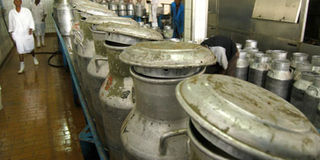Fluctuating milk yield hurts dairy industry

Staff of New KCC, Kiganjo Plant. Four former senior managers of the New Kenya Co-operative Creameries (KCC) have been awarded over Sh4 million terminal dues. PHOTO | FILE
What you need to know:
- Periodic fluctuations hinder value addition, which can help stabilise prices and increase Kenya’s exports, promoting rural sustainable development and transformation in Africa report notes.
- Consequently, less than half of the milk produced in Kenya is processed and used in the formal market. The rest is used in the informal or raw milk market despite its attendant health risks.
- Kenyan dairy plants process a very small percentage of milk produced in the country annually, exposing a huge segment of the market to raw milk suppliers some of who adulterate the milk with harmful chemicals.
Unreliable milk production in Kenya is undermining investments in the industry.
The trend exposes the sector to risks associated with use of raw milk, a new report has said.
Periodic fluctuations hinder value addition, which can help stabilise prices and increase Kenya’s exports, promoting rural sustainable development and transformation in Africa report notes.
Consequently, less than half of the milk produced in Kenya is processed and used in the formal market. The rest is used in the informal or raw milk market despite its attendant health risks.
“Utilisation rate of the processing sector is a low 50 per cent, which deters investors. This is due to huge fluctuations in supply,” the survey by African Centre for Economic Transformation adds.
“The concern in informal milk trade revolves around health issues. Poor handling of milk is also a major concern as milk traders are largely unregulated and many of them do not use food-grade containers to transport milk”.
The raw milk market mainly serves the low income and rural households, which may not afford processed milk.
The business is dominated by smallholders, whose production is hurt by poor animal husbandry. The milk traders are also largely unregulated.
HUGE POTENTIAL
The study was conducted in partnership with the Centre for Africa Bio Enterprises, Kenya Industrial Research and Development Institute, Sorghum Value Chain Development Consortium/Jomo Kenyatta University of Agriculture and Technology, the University of Nairobi and Kenya Agribusiness and Agroindustry Alliance and supported by Bill & Melinda Gates Foundation.
The survey further notes that the industry is unable to realise its full potential thanks to inadequate private sector investment and low level of value addition. Poor handling and transportation of the produce from the farm also presents a major challenge to the sector’s development.
“Poor infrastructure means that milk is transported in all manner of ways, including head-loading, bicycles and motorcycles. Poor roads and some modes of transport lead to spillage and contamination,” the report says.
However, the sub-sector, which is considered the second most important after the meat sub-sector in agriculture, has a huge potential to create jobs and help fight poverty.
Kenya’s fast-growing retail chains can easily reach the emerging urban and middle-class markets across the region with dairy products.
Kenya’s dairy industry, one of the largest in sub-Saharan Africa, contributes 14 per cent of the country’s agricultural output and about 3.5 per cent to the gross domestic product.
Though only a small percentage of raw milk is processed through the formal chain, a small-scale processing industry yielding a wide range of dairy products has developed.
Data from the Kenya Dairy Board indicates that formal milk intake has been growing at 12 per cent yearly over the last 10 years, outpacing milk production.
Provision of incentives for processors to buy milk-drying equipment to reduce waste when there is glut is one of the policy recommendations for improving the dairy business.
An estimated 5.2 billion litres of milk are produced in Kenya annually. However, just about 547.5 million litres of milk are processed annually (1.5 million litres daily) leaving out a large raw milk consumption market, which the processors are struggling to exploit.
RAW MILK VENDORS
It confirms the long standing fears the industry has held over the proliferation of the raw milk market, which is exploited by unscrupulous vendors who at times adulterate the milk before selling.
In October last year, the chairman of the Kenya Dairy Processors Association (KDPA), Kipkirui Lang’at, indicated that Kenyan dairy plants process a very small percentage of milk produced in the country annually, exposing a huge segment of the market to raw milk suppliers some of who adulterate the milk with harmful chemicals.
This continues to potentially expose the raw milk consumers to health risks arising from adulterated milk that is mostly sold by small scale traders in many parts of country.
He cited many cases where milk traders who collect milk from farmer, lack proper storage or transportation facilities and add water and other chemical substances and sell the milk to the market cheaply undercutting established processors.
This is despite many processors’ heavy investment in equipment and technologies to ensure that the milk to be delivered to consumers reaches them in good state.
An estimated 5.2 billion litres of milk are produced in Kenya annually. However, just about 547.5 million litres of milk are processed annually (1.5 million litres daily) leaving out a large raw milk consumption market the processors are struggling to exploit.
The milk processed relative to that which is produced is inadequate. Also, over 60 per cent of the dairy products consumed in the local market is in liquid form, with other products like cheese, butter and cream yet to attract substantial demand.
Some of the dairy milk processors in the country, under the KDPA include New KCC, Brookside Dairy, Githunguri Cooperative, Happy Cow, Sameer Agriculture and Livestock Limited, Kinangop Dairy, Sun Power, Eldoville Dairies, Meru Central Dairy and Afrodane Food. About five of these processors however control 90 per cent of the milk processed in the country. Some of the dairy products produced by these local milk processors include yoghurt, fresh milk, flavoured milk, fermented milk, milk powder, butter, ghee and cream.





